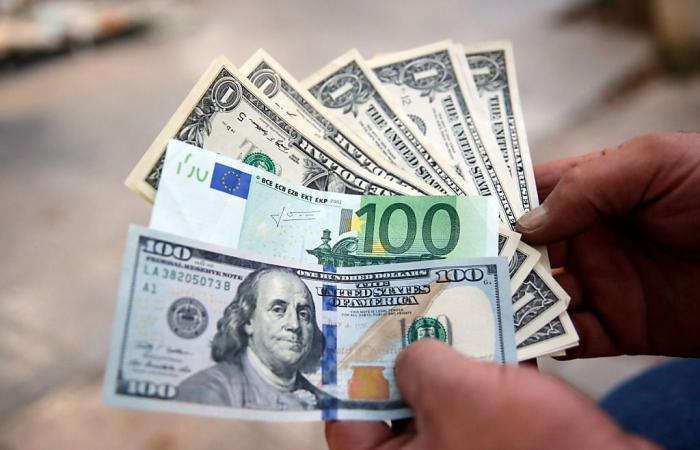The euro fell to its lowest in two years against the dollar on Friday, and the pound retreated, both undermined by lower-than-expected November economic activity indexes that reinforced expectations of rate cuts from their central banks .
Around 11:35 a.m., the European currency fell by 0.45% against the greenback, to 1.0426 dollars per euro, after falling more heavily by 1.32% to 1.0335 dollars, its lowest level since the end of November 2022. against the greenback. The European currency also lost ground against the franc, at 0.925 francs.
Also weighed down by an activity index, the pound fell by 0.47% against the American currency, to 1.2529 dollars, after having touched 1.2487 dollars, a lowest since May. The two currencies suffer from a divergence between the monetary policies of their central banks and that of the Federal Reserve (Fed), expected to be firmer than expected since Donald Trump won the presidential election on November 5 in the United States.
Private sector activity in the euro zone contracted in November, to 48.1, after 50 in October, according to the Flash PMI published Friday by S&P Global. Calculated on the basis of business surveys, it fell to its lowest level in 10 months, and below economists' expectations. A number above the 50 mark signals growth in activity, while a number below reflects a contraction.
'Eurozone data has increased the likelihood of further rate cuts from the European Central Bank (ECB) next year,' summarizes XTB's Kathleen Brooks. If the market was already 'certain that the ECB will reduce its rates next month', it now envisages a reduction of half a percentage point, adds the analyst.
In the United Kingdom, private sector activity fell to the lowest in more than a year, to 49.9 in November, compared to 51.8 the previous month, according to the Flash PMI, a figure also lower than projections.
As a result, 'expectations of a rate cut at the December meeting' of the Bank of England (BoE) have increased, as have expectations of further cuts in 2025, notes Ms Brooks.
For the BoE 'the key question will now be to assess whether the potential inflationary impact of tax increases' planned by the recent British budget 'compensates for weaker demand', tempers Sanjay Raja, analyst at Deutsche Bank.
For its part, bitcoin reached $99,505.45 on Friday, before falling to $98,712 around 12:20 p.m., close on the heels of the highly anticipated threshold of $100,000. The most capitalized cryptocurrency continues to ride the wave of enthusiasm in the sector generated by the election of Donald Trump.
/ATS






